- Home
- G. K. Chesterton
The Universe According to G. K. Chesterton Page 5
The Universe According to G. K. Chesterton Read online
Page 5
grotesque: the fierce and humorous energy in things, the defiant and wholesome ugliness of courage and experience. (The Speaker, Feb. 23, 1901)
grumbling: carelessness as applied to criticism; anger in solution. (New Witness, Feb. 17, 1916; Illustrated London News, May 24, 1919)
Grunky: a word which I invented at the age of five, to express my religious sentiments. (Daily News, May 14, 1904)
guild: a self-governing body trying to preserve the status of the profession. (G.K.’s Weekly, Dec. 19, 1925)
gusto: a boyish power of enjoyment. (New York American, Dec. 22, 1934)
H
habit: a thing a man could abandon and is not specially concerned with, but which he finds himself dropping into here and there in the varied concerns of life. (Hearst’s Magazine, July, 1913)
happiness: a state of the soul in which our natures are full of the wine of an ancient youth, in which banquets last for ever, and roads lead everywhere, where all things are under the exuberant leadership of faith, hope, and charity. (“Charles Dickens,” The Bookmen, May, 1903)
head: the thing that talks; an abnormal excrescence where, it has been conjectured, there dwells a principle called a Mind. (Illustrated London News, Apr. 22, 1911; Jan. 6, 1934)
health insurance: a stake men can only put down by being poorer than they are, and only get back by being sicker than they are. (Illustrated London News, Jan. 25, 1913)
Heaven: our native land. (“At Overroads Door,” Return to Chesterton)
hedonism: being more sick of happiness than an invalid is sick of pain; an art sense that seeks the assistance of crime since it has exhausted nature. (“Savonarola,” Twelve Types)
Hell: the place where nothing can happen; the home of dishonesty; the cosmic lunatic asylum; energy without joy; an infinity of falling. (“On the Alleged Optimism of Dickens,” Charles Dickens; Illustrated London News, Nov. 28, 1909; Daily News, Nov. 23, 1907; Introduction to Thackeray; “Fear,” Lunacy and Letters)
heraldry: a science of imagery. (“The Antiquity of Civilisation,” The Everlasting Man)
heredity: that half-formed philosophy of fears and omens, of curses and weird recurrence and darkness and the doom of blood. (“The Unanswered Challenge,” Eugenics and Other Evils)
HEAD
heresy: the exaltation of something which, even if true, is secondary or temporary in its nature against those things which are essential and eternal, those things which always prove themselves true in the long run; a truth taught out of proportion; a truth that hides all the other truths; an infectious disease of the intellect. (William Blake; Daily News, June 26, 1909; “St. Thomas More,” The Well and the Shallows; “Ibsen,” A Handful of Authors)
heretic: a man who prefers his criticism to his Catholicism; a man who loves his truth more than truth itself; a martyr to false gods. (“The Religion of Chaucer,” Chaucer; “On Reading,” The Common Man; The Bookman, April, 1903)
hero: a human who, by a certain godlike illogicality, is more human than humanity itself. (Daily News, April 30, 1904)
heroism: a blazing indiscretion. (Illustrated London News, May 27, 1911)
hill: a bulky feature in the landscape. (Daily News, April 4, 1908)
historian: one who has to explain the horrible mystery of how fashions were ever fashionable. (Illustrated London News, Oct. 8, 1910)
historians: the absent-minded race of men. (Illustrated London News, April 6, 1935)
history: a hill or high point of vantage from which men see the town in which they live or the age in which they are living. (Illustrated London News, June 18, 1932)
hobby: a sort of soothing madness. (Daily News, Feb. 11, 1905)
holiday: a holy day, a word that will always answer the ignorant slander which asserts that religion was opposed to human cheerfulness and will always assert that when a day is holy it should also be happy; a restoring thing that, by a blast of magic, turns man into himself. (Illustrated London News, Sep. 29, 1906; “The War on Holidays,” Utopia of Usurers)
home: partly an inn for rest, partly a school for education, and partly a temple for the dedication of human souls to some unifying duties of life. (Daily News, Oct. 23, 1909)
hope: the thing that never deserts men and yet always, with daring diplomacy, threatens to desert them; hoping when things are hopeless; the power of being cheerful in circumstances which we know to be desperate. (G. F. Watts; “Paganism and Mr. Lowes Dickinson,” Heretics)
horseracing: an activity that is so unexciting that people have been obliged to make an artificial arrangement whereby something shall happen to their balances at a bank before they can overcome their ingrained indifference to one horse or another. (Daily News, June 25, 1904)
hospitality: the most ancient of human virtues, the normal and dignified manner of mixing with the world; the way which leaves a certain responsibility, at once creative and vigilant, in the maker and master of the feast, and bids him, as in the parables and the nursery rhymes, to call in his neighbors to be his friends. (Illustrated London News, Mar. 12, 1927)
hostess: a woman whose talent is to make two people talk when they hate it, and part them when they are beginning to like it. (“When Doctors Agree,” The Paradoxes of Mr. Pond)
housekeeping: the practice of a hundred arts and crafts. (“The End of Wisdom,” The Collected Works of G. K. Chesterton, Vol. 14)
human: to be incalculable. (Illustrated London News, Feb. 9, 1907)
humanitarian: one who upholds the claims of all creatures against those of humanity. (“The Eternal Revolution,” Orthodoxy)
humanitarianism: the horrible habit of helping human beings only through pitying them, and never through respecting them. (“About Voltaire,” As I Was Saying)
Humanity: a thing most of us have never seen even in a vision. (Daily News, Feb. 11, 1905)
humility: the permanent human paradox that the best thing is something which a man may have, but which a man must not claim; the luxurious art of reducing ourselves to a point, not to a small thing or a large one, but to a thing with no size at all, so that to it all the cosmic things are what they really are—of immeasurable stature; a restraint upon the arrogance and infinity of the appetite of man; making the subjective objective—the realization that, to the universe, oneself is not I, but only he. (Daily News, July 28, 1906; “A Defence of Humility,” The Defendant; “The Suicide of Thought,” Orthodoxy; Illustrated London News, Feb. 26, 1916)
humor: a term which not only refuses to be defined, but in a sense boasts of being indefinable (and it would commonly be regarded as a deficiency in humor to search for a definition of humor); the most erratic of spiritual forces, eternally dancing between reason and unreason; the sentinel of humility; making game of man, that is, to dethrone him from his official dignity and hunt him like game; a subtle relish for the small incongruities of society. (“Humour,” The Spice of Life; “The Library of the Nursery,” Lunacy and Letters; Illustrated London News, Nov. 4, 1916; “The Flat Freak,” Alarms and Discursions; “Mark Twain,” A Handful of Authors)
HUMOR
hygiene: the superstition of soap; the vision of humanity in a network of precautions against remote possibilities, so that a man must not drink from a well for want of a filter or keep a dog for fear of hydrophobia or let his little girl’s hair grow for fear of verminous accidents. (“The School for Hypocrites,” What’s Wrong with the World; Daily News, Sept. 11, 1909)
hypocrisy: moral sentiments used for immoral objects. (“Rhymes for Children,” GKC as MC)
hypocrite: the unluckiest of actors who is never out of a job. (Illustrated London News, June 13, 1914)
hypothesis: the unknown. (“The Empire of the Insect,” What’s Wrong with the World)
I
iconoclast: the lowest of all the unskilled trades. (Daily News, April 26, 1905)
idea: something that a man can agree or disagree with. (Illustrated London News, Aug. 9, 1930)
ideal: an aim; for many modern idealists, a thing that is only called an Ideal because it does not exist. It is at best a possibility, or perhaps only a pattern or abstract method of measurement. The less it is a Reality, the more it is an Ideal. (Illustrated London News, Jan. 28, 1933)
idealism: considering everything in its practical essence. (“An Unpractical Man,” What’s Wrong with the World)
idealist: a visionary; a man who believes more than he sees; certainly a man who believes much more than other men believe. (Illustrated London News, April 7, 1934)
idol: the thing which wild human creatures (and tame human creatures too) make from some dark impulse to realize their own bad dreams. (Illustrated London News, Nov. 25, 1905)
idolatry: a condition that exists where the thing which originally gave us happiness becomes at last more important than happiness itself; the preference for the incidental good over the eternal good which it symbolizes; the elementary mathematical and moral heresy that the part is greater than the whole. (“Lunacy and Letters,” Lunacy and Letters)
idiom: a language that has produced out of its own national history certain typical turns of phraseology that correspond to philosophy. (New York American, Aug. 10, 1935)
imagination: the mightiest of the pleasures; a thing of clear images. The more a thing becomes vague the less imaginative it is, the more a thing becomes wild and lawless the less imaginative it is. The function of imagination is not to make strange things settled, so much as to make settled things strange; not so much to make wonders facts as to make facts wonders. (“The Suicide of Thought,” Orthodoxy; Illustrated London News, Mar. 24, 1906; “A Defence of China Shepherdesses,” The Defendant)
immoralize: to moralize against morality. (“On Bright Old Things,” Sidelights)
impartiality: a pompous name for indifference; another name for impossibility. (The Speaker, Dec. 15, 1900; Illustrated London News, Nov. 11, 1922)
Imperialism: the desire to possess distances even without enjoying them. (Daily News, Sept. 17, 1901)
Impressionism: the substitution of atmosphere for shape, the sacrifice of form to tint, the cloudland of the mere colorist; believing one’s immediate impressions at the expense of one’s more permanent and positive generalizations; putting what one notices above what one knows; the monstrous heresy that seeing is believing; that final skepticism which can find no floor to the universe. (William Blake; “The Criminals Chase the Police,” The Man Who Was Thursday)
impulse: something which need not be explained because it cannot be explained, an airy, instinctive, intangible, innocent kind of prejudice; a slight and fleeting feeling that could not be explained to a policeman, which perhaps the very appearance of a policeman out of the bushes might destroy. (Illustrated London News, Aug. 10, 1907)
incarnation: the inevitable result of love, which leads to the inevitable result of crucifixion. (Illustrated London News, Aug. 20, 1927)
inconvenience: an adventure wrongly considered. (“On Running After One’s Hat,” All Things Considered)
indifference: an elegant name for ignorance. (The Speaker, Dec. 15, 1900)
individualism: the instinct of escape; a communal mass of selfishness. (American Magazine, April 1931; Illustrated London News, Feb. 25, 1928)
Industrialism: the system run by a small class of Capitalists on a theory of competitive contract; another name for hell. (“The Break-Up of the Compromise,” Victorian Age in Literature)
industry: labouring incessantly to make labour-saving machines. (G.K.’s Weekly, Mar. 2, 1929)
infanticide: murder at its worst; not only the brand of Cain but the brand of Herod. (Illustrated London News, June 3, 1922)
injustice: the denial of right. (Illustrated London News, Feb. 3, 1917)
insomnia: one of the things which wealth cannot prevent, and education may possibly even promote. (New Witness, Aug. 29, 1919)
inspired: breathing from a bigger self and telling more than one knows. (“The Dramatist,” George Bernard Shaw)
instinct: buried reason. (Illustrated London News, Jan. 22, 1916)
intellectuals: imbeciles whose minds have been mashed into mire by passing wagons of polysyllables, and have just breath enough left to say “reactionary,” marked by the loose use of labels, the refusal to follow an argument; the scatter-brained pursuit of mere associations, and the total inability to write sense, but even to read it. (New Witness, Feb. 24, 1916)
intelligence: the power of dogmatizing rightly. (Platitudes Undone.)
irreligious: to doubt things which men’s normal imagination does not necessarily doubt. (“The Break-up of the Compromise,” Victorian Age in Literature)
INSOMNIA
J
Jazz: a nightmare of noise, recalling the horns of hell, generally accompanied by an undercurrent of battering monotony; the Song of the Treadmill. (“On the Prison of Jazz,” Avowals and Denials)
Jingoism: irresponsibility, hysterical cruelty, looseness, vulgarity, and verbosity; in politics and patriotism, the habit of employing anger as a frivolity, drawing upon a reserve of wrath for a daily pleasure. (Daily News, June 26, 1901; May 25, 1907)
joke: something that need have no sense, except that one wild and supernatural sense which we call the sense of humor. (“The Flat Freak,” Alarms and Discursions)
journalism: writing badly; writing badly on an enormous scale; the art of doing dull things in a hurry; a machine for multiplying and magnifying one small thing indefinitely; the art of pretending to know. (“On Writing Badly,” A Handful of Authors; Illustrated London News, Feb. 7, 1925; G.K.’s Weekly, Mar. 28, 1925; Speech to the Johnson Society of London)
journalist: one who is vastly ignorant about many things, but who writes and talks about them all; a person who understands nothing except how to write about everything he does not understand. (The New York Times, Jan. 11, 1921; Week-end Review, Dec. 20, 1930)
joy: an elusive and elvish matter that is our reason for existing; the uproarious labor by which all things live. (“A Defence of Farce,” The Defendant; “Authority and the Adventurer,” Orthodoxy)
junk: treasures, of which the most precious are difficult to connect with any purpose whatever. (“The Mask of Midas,” The Collected Works of G. K. Chesterton, Vol. 13)
jury: the only really representative parliament, because people do not want to serve on it. (G.K.’s Weekly, Nov. 11, 1932)
justice: the first human sense, which is the critic of all human institutions; an abstract, virgin, and wholly virtuous intolerance of a tale ending wrong; the refusal of the intellect to accept the prospect of everything being for ever upside down; a thing for which fools look in history and wise men in the Day of Judgment. (Illustrated London News, Aug. 17, 1907; Feb. 3, 1917; “Thomas Carlyle,” Varied Types)
K
knife: a short sword. (“What I Found in My Pocket,” Tremendous Trifles)
knighthood: originally, a title given to a man to further spur him to honor and bravery and chivalry. The knighthood in our time is not as a rule given to a man before, but rather after he is fortunate. The whole point of knighthood was that the knight should arrive late but not too late. Had St. George not been late there would have been no story. Had he been too late, there would have been no princess. (Illustrated London News, June 22, 1907; “The Eve of the War,” Gilbert Keith Chesterton)
L
labor: the servant of exchange. (G.K.’s Weekly, Jan. 14, 1933)
language: an arbitrary system of grunts and squeals. (G. F. Watts)
Latitudinarian: the New Theologian of today who holds a high seat in that modern Parliament of Religions where all believers respect each other’s unbelief. (“The New Theologian,” A Miscellany of Men)
KNIGHTHOOD
laughter: the power of uproarious reaction against ourselves and our own incongruities; the juncture of love and knowledge. (Illustrated London News, Sept. 9, 1922; Early Notebooks)
law: a thing that can be broken. (“A Fairy Tale,” Lunacy and Letters)
learning: misled by the label on the bottle. (“The Victorian Compromise,” Victorian Age in Literature)
legend: something that grows slowly and naturally and generally does symbolize some sort of relative truth about history; things that may never have happened, or, as some say, could never have happened, that are nevertheless rooted in our racial memory like things that have happened to ourselves; a thing that men vaguely cling to because it is true. (“The Tribal Triumph,” The End of the Armistice; “The Romance of Rhyme,” Fancies vs. Fads; Illustrated London News, Sept. 4, 1909)
leisure: a word that means three totally different things: 1. being allowed to do something, 2. being allowed to do anything, 3. being allowed to do nothing. (Illustrated London News, July 23, 1927)
Leisure State: the suggestion that mankind need not work, on the assumption that machinery will work. (G.K.’s Weekly, April 25, 1935)
Liberal: (n.) a man who, if he could by waving his hand in a dark room, stop all the deceivers of mankind forever, would not wave his hand. (“Browning in Italy,” Robert Browning)
liberal: (adj.) a hospitality of the intellect and a hospitality of the heart. (Elizabeth Barrett Browning,” The Common Man)
Liberalism: a hunger for humanity. (Daily News, Feb. 8, 1902)
Libertarianism: the unreasonable neglect of government. (“The Higher Anarchy,” What’s Wrong with the World)
liberty: the possession by a person of a certain limited imperium or circle of power within which he acts by choice and is a creator or an artist; the more mystical form of the true idea of property; the power of a thing to be itself; the living influence of the citizen on the State in the direction of molding or deflecting it; the very last idea that seems to occur to anybody, in considering any political or social proposal. (New Witness, July 27, 1916; July 23, 1920; “The Yellow Bird,” The Poet and the Lunatics; “The Free Man,” A Miscellany of Men; Illustrated London News, June 5, 1920)

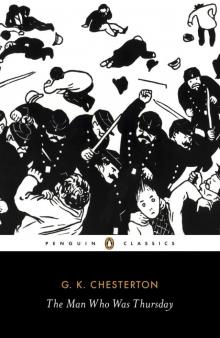 The Man Who Was Thursday: A Nightmare
The Man Who Was Thursday: A Nightmare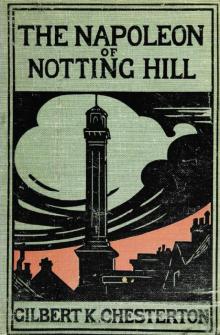 The Napoleon of Notting Hill
The Napoleon of Notting Hill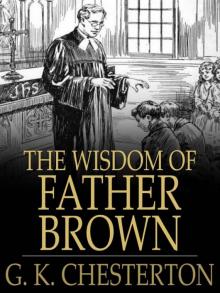 The Wisdom of Father Brown
The Wisdom of Father Brown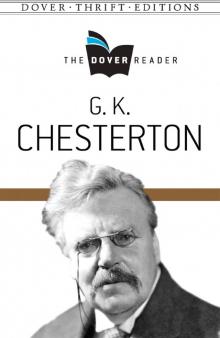 G K Chesterton- The Dover Reader
G K Chesterton- The Dover Reader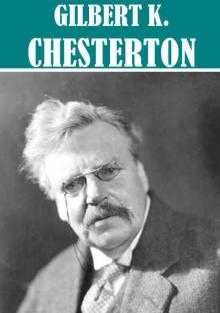 The Essential G. K. Chesterton
The Essential G. K. Chesterton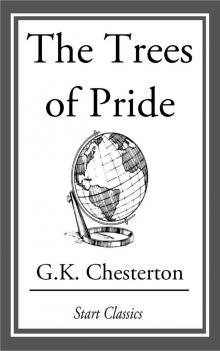 The Trees of Pride
The Trees of Pride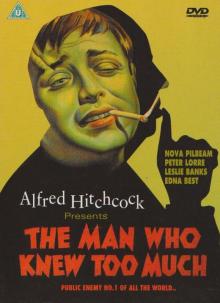 The Man Who Knew Too Much
The Man Who Knew Too Much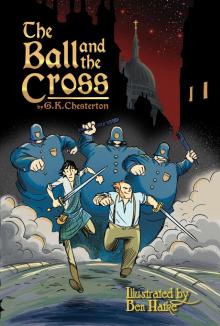 The Ball and the Cross
The Ball and the Cross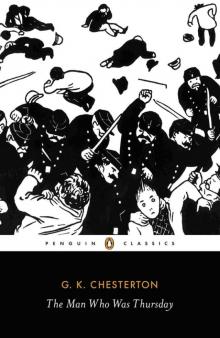 The Man Who Was Thursday (Penguin ed)
The Man Who Was Thursday (Penguin ed)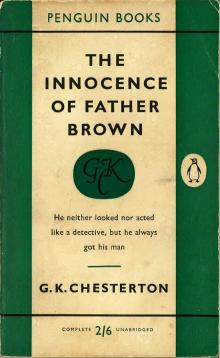 The Innocence of Father Brown
The Innocence of Father Brown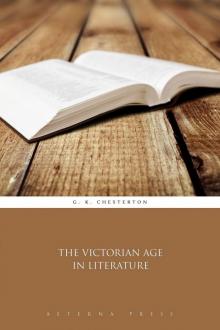 The Victorian Age in Literature
The Victorian Age in Literature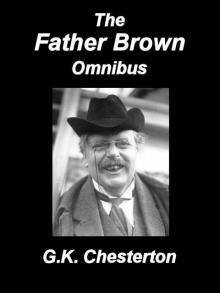 Father Brown Omnibus
Father Brown Omnibus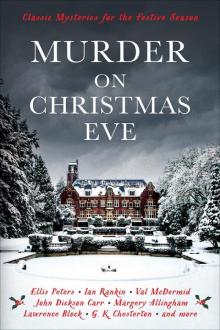 Murder On Christmas Eve
Murder On Christmas Eve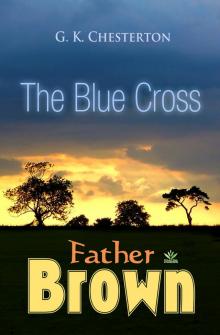 The Blue Cross
The Blue Cross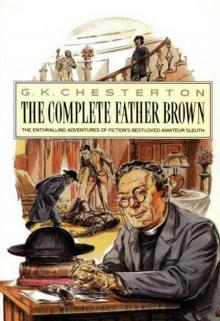 The Complete Father Brown Mysteries Collection
The Complete Father Brown Mysteries Collection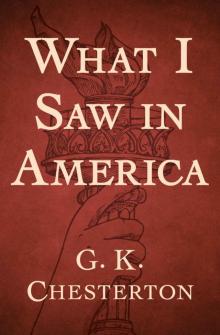 What I Saw in America
What I Saw in America